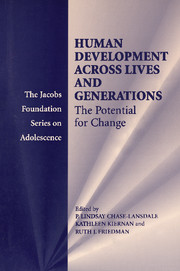Foreword
Published online by Cambridge University Press: 12 October 2018
Summary
It has been known for a long time that adverse environments (including poverty, family discord and disruption, and parental neglect) are associated with a substantially increased risk that the young people being reared in these conditions will suffer in their psychological development and functioning. The observation is important in highlighting the ill effects of deleterious rearing circumstances. However, it has often been assumed that the effects are necessarily lasting, blighting the future of young people through the course of their development from childhood to adult life. Similarly, it has sometimes been claimed that the effects lead to intergenerational cycles such that the problems of one generation are inevitably recapitulated in the next generation. But are these assumptions and claims valid? That question constitutes the main basis for this book, which is the third volume in the Jacobs Foundation Series on Adolescence, published by Cambridge University Press. The answer to the question is crucial to decisions on both public policy and the planning of preventive and therapeutic interventions.
The Jacobs Foundation is dedicated to the improvement of the lives of young people everywhere, but with a Special focus on those suffering from deprivation and disadvantage. We recognize that, in order to do this, we need to support innovative projects and programs and high-quality research. In addition, we Sponsor annual Conferences that have three main goals: 1) to inform policy makers of the messages from research that should guide their thinking; 2) to fester the work of young investigators; and 3) to encourage researchers to consider new and better ways of tackling the major questions that need to be answered if young people across the world are to be able to have better lives in the future. Often that means asking challenging questions about what we really do know on specific issues. The Conference held in 2001 did just that with respect to intra- and intergenerational continuities. This volume is not the proceedings ofthat Conference; rather, it constitutes a set of chapters that build on what was learned at the meeting.
The contributors to this book represent a wide variety of disciplines, and the volume gains much of its strength from its interdisciplinary and international approach. A major theme throughout is the potential for change, but attention is drawn to the societal, family, and individual factors that provide either a facilitation of change or constraints on its actualization.
- Type
- Chapter
- Information
- Human Development across Lives and GenerationsThe Potential for Change, pp. xvii - xviiiPublisher: Cambridge University PressPrint publication year: 2004

